Enjoy wonderful scenery, people, and food while trekking the Atlas Mountains
[Updated April 2020]
This post contains affiliate links for which Expedition Wildlife may receive a commission (where applicable) at no additional cost to you.
I am so excited to write about my experience trekking the Atlas Mountains of Morocco, for a number of reasons.
First, this is a stunning part of the world, where the scenery, people, and food are warm and welcoming. It’s easy to enjoy spending time in this region.
I’m most excited about sharing this trip, however, because of the circumstances under which I visited Morocco. I traversed the winding streets of Marrakech’s Medina and the mountains and valleys at the base of Mount Toubkal with three women who inspire me.
We laughed through chilly days and nights, tough uphill treks, a blizzard (I’m serious), and the delirious nature of the high-altitude environment. Sharing stories beside wood-fire hearths each night, we rejoiced in the sisterhood and bonds we’d formed over such a short period of time.
Trekking the Atlas Mountains can be somewhat arduous, so knowing your fitness level and limit is important.
Going with a guide can make all the difference, especially arranging transport of your food, water, and gear.
A guide is also now required to summit Mount Toubkal.
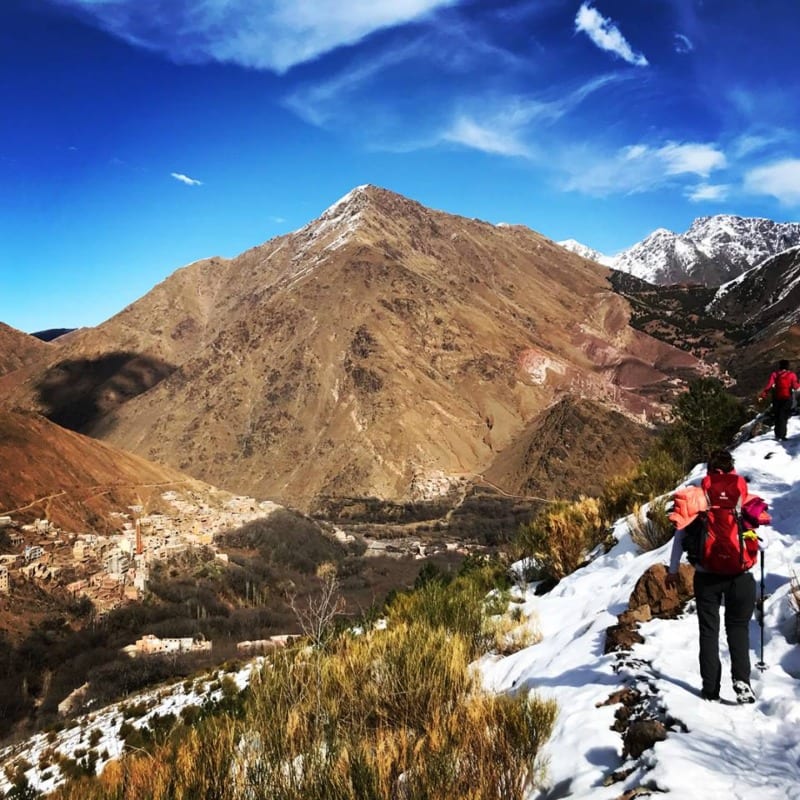
Looking out toward Dar Imlil on the route from Tizi Oussem to Imlil. Photo by Sara Rose
Selecting a Guide to Trek the Atlas Mountains
Recommendation: Aztat Treks
We selected Aztat Treks guide company for trekking the Atlas Mountains for a number of reasons.
First, they’re very highly rated and get fabulous reviews across the board.
Second, they responded to our questions and concerns in a timely and respectful manner. A couple other guides we contacted harassed us by email for days, suggesting other tours we could take and wondering if we had made a decision yet.
Third, the price was phenomenal for what was included in the trip.
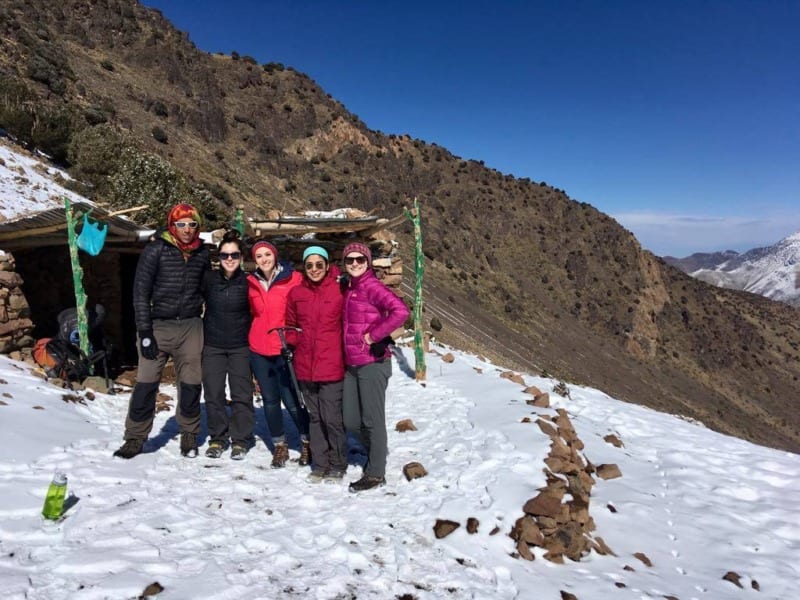
Our trekking group, including our guide, Mohamed of Aztat Treks. Photo by kind passersby :)
There are other guide options for summiting the mountain. If you aren’t sure you want to summit, consider trekking around the Berber villages for a few days! Short on time, try to head to the mountains for at least a day.
Interested in our other treks? Check out our guide to hiking the GR20 in Corsica!
About our Aztat Tour
The company was founded by Mohamed Aztat, who also happened to be our guide four our tour.
Mohamed is incredibly knowledgeable about the region, as he grew up in the town of Imlil at the base of Mount Toubkal. By his account, he’s climbed the mountain hundreds of times. Not just climbed it, but raced to the top of it, too.
Along our journey, he would say “hello” to neighbors and family who also lived in the area. Everyone looked out for their neighbors’ and family’s interests.
Our tour specifically covered a 4-day, 3-night hike through the Berber village of Tizi Oussem to Imlil, then up to the Refuge at the base of Mount Toubkal.
The tour was all-inclusive, including transportation, accommodation, three FULL meals a day (plus water and snacks), a personal guide 24/7, and two porters to transport our other gear from location to location in the mountains.
We coordinated with Mohamed ahead of time to verify the gear we needed to bring from home, and what we could rent through Aztat.
If you are planning to do more hikes in the area, consider getting Cicerone’s guide to The High Atlas. Having a paper guide, with maps and descriptions of the region, can be helpful in further visualizing your routes and experiences.
What to expect on the trails to Mount Toubkal
Your starting point for trekking the Atlas Mountains
We suggest basing yourself initially in Marrakech. Guides will pick up travelers directly from their accommodation in the city.
This also gives you the opportunity to extend your stay a couple of extra days to see what Marrakech has to offer!
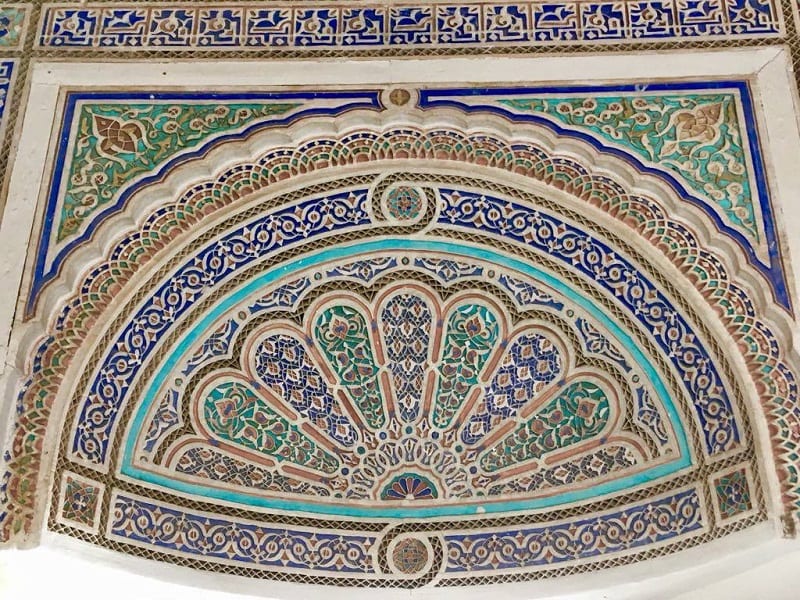
The art and architecture of beautiful places such as Bahia Palace are worth a visit! Photo by Christa Rolls
Hiking through Berber Villages
The Berber people have a long history and are thought to be the first inhabitants of Northern Africa.
Sandstone homes make up the small Berber villages throughout the region. Blending into the landscape, it’s pretty magical happening upon them suddenly.
Each village has its own resources, including a mosque. Listen for the calls to prayer throughout the day floating through the mountain landscape.
You may see shepherds herding their sheep through the mountains and hills. We suggest NOT taking photos of them as they are very private people and it is considered rude to do so without permission.
ENJOY this incredible cultural experience!
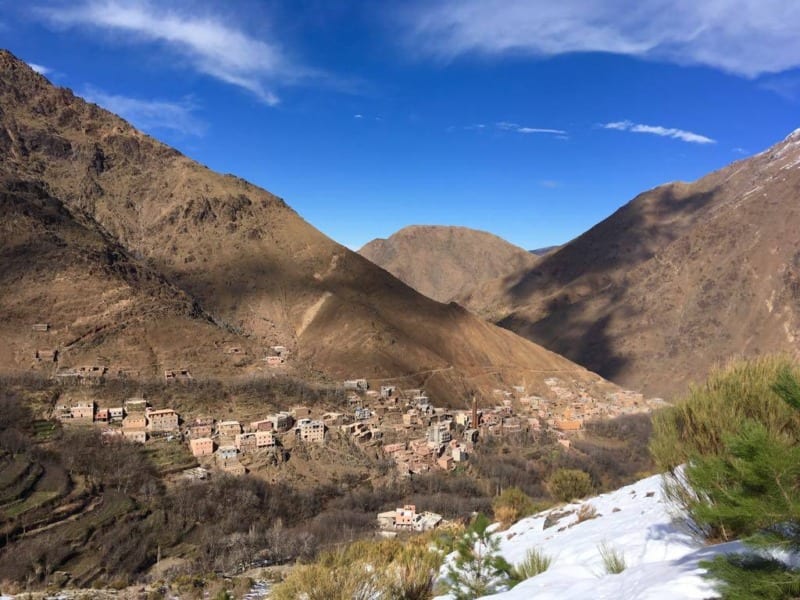
Note how well these beautiful towns blend into the surrounding landscape. Photo by Christa Rolls
Trekking the Atlas Mountains to Mount Toubkal
Mount Toubkal is 4,167 meters (13,671 feet) high, making it the tallest mountain in the Atlas Mountains and Northern Africa.
The unique ecosystems surrounding the mountain are especially beautiful, so take notice of the plant life and organisms that call the mountain home.
Altitude sickness can start around 3,000 meters, and symptoms might include headache, dizziness, shortness of breath, nausea, and vomiting. If you experience severe symptoms as you climb the mountain, let your guide know and likely you will need to descend immediately.
Slowly acclimating to the altitude can help your body adjust to the difference. This is why guides tend to recommend staying at the Refuge Toubkal overnight, then getting up early the next morning to the summit. Importantly, take your time climbing the mountain, and leave plenty of days to comfortably climb and acclimate to the mountains.
The paths up toward Toubkal can become narrow and rocky, with some parts covered in scree, or shifting rocks. Exercise caution during your trek, and take it one step at a time.
At the top of Mount Toubkal’s summit is a metal pyramid to mark the summit point – this is your beacon!
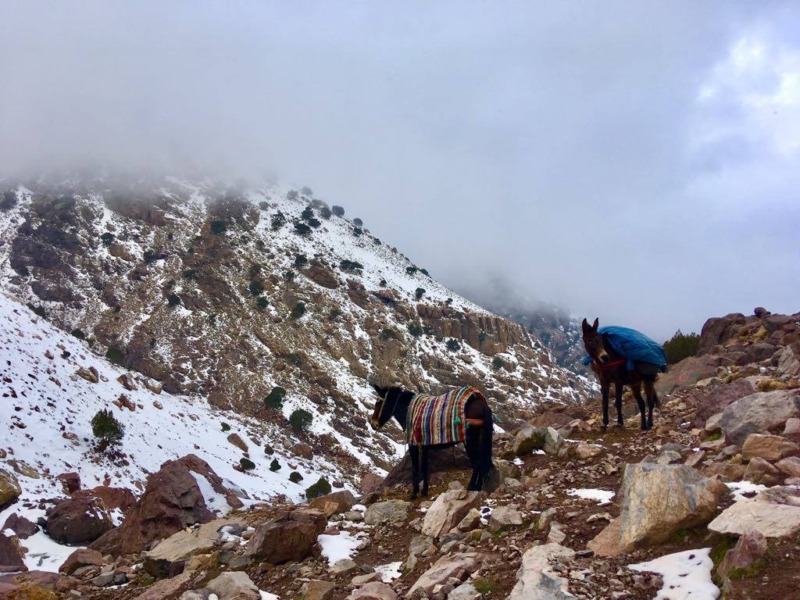
Donkeys and mules are readily seen on the trails to assist with packing up gear and equipment. Photo by Christa Rolls
Toilets
This was the first time we had experienced the “squat and go” toilet. I think it is worth mentioning since I know some potty-squeamish people.
Toilets throughout Morocco tend to those where you squat over a modified toilet bowl on the floor. Most all of them will be accompanied by a water bucket or a tap with a bucket underneath. These toilets use require adding water to the hole to push everything down as a system of flushing.
Know before you go that rural locations will not have sit-toilets, though riads and various forms of accommodation may.
Your guide will tend to have at least one roll on them for your convenience. If you’re traveling around the country overall, consider bringing along a roll for your pack, along with hand sanitizer.
Water
The water used for the ever-prevalent hot mint tea should be OK to drink since it has been boiled. Trust me, you don’t want to miss that delicious, sweet and minty tea!
Do not drink water out of the streams or the tap. Instead, bring a water filter along (such as a built-in filter water bottle or a sawyer mini) or purchase water bottles.
Guides should provide water for you through the duration of your trek.
Weather
Because of Morocco’s place in Northern Africa, it gets quite hot in the summertime and for much of the year. The mountains, however, can still have finicky weather, especially in wintertime.
Check forecasts for the mountain itself (not just Marrakech) and plan your packing list accordingly.
We made sure to bring along gloves, hats, scarves, and warm hiking socks. These come in handy for the refuges, as it can get cold at night in the mountains with no heater near the bed.
After experiencing a blizzard in the mountains, we headed back to Marrakech to around 70 degrees F (21 degrees C) weather. Thankfully, our wardrobe included a couple of lighter weight shirts for the city.
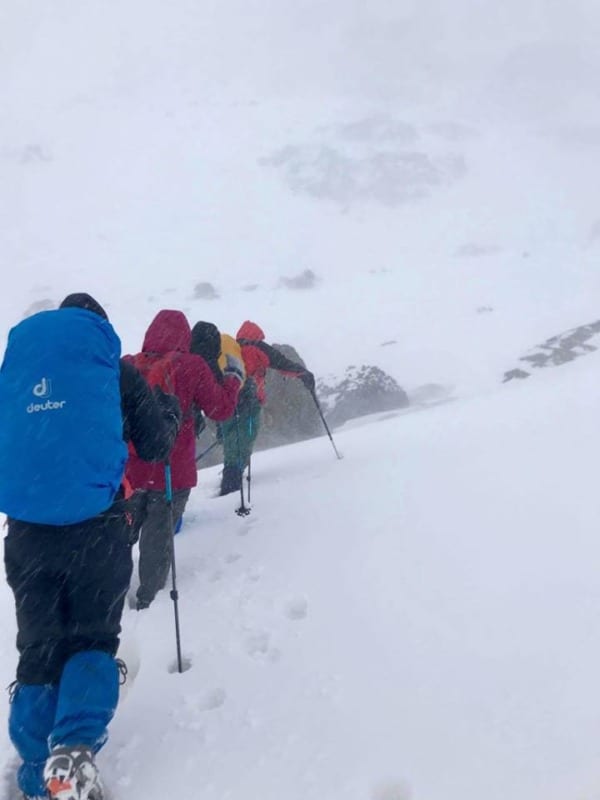
All geared up and ready for the blizzard that came overnight in the mountains! Photo by Sara Rose
Safety
As of early 2019, visitors are required to obtain a guide when hiking Mount Toubkal.
Our group felt safe with Mohamed and his team throughout the duration of our trip. However, it’s always important to remain cognizant of any potential dangers while traveling.
The safety of visitors is important to the people and guides who live there, as is evidenced by the new requirement.
Mohamed also relayed to us that when trekkers go up to Mount Toubkal without a guide, the refuge takes note. Rescue teams are sent out if anything seems amiss, typically when hikers become lost or ill on the trail. Even so, avoid putting yourself in a situation where you have to be rescued.
Whenever you travel, register with your country’s emergency notification program to receive notifications of potential dangers in an area. In the United States, this is STEP or the Smart Traveler Enrollment Program.
Always write down and keep the contact information for your embassy or consulate when traveling out of the country.
Other tips and information for Trekking the Atlas Mountains
Food
Moroccan food was some of our favorite, and we really enjoyed the tasting of different options!
Tajine-made food is some of the most common you’ll find, and it’s absolutely hearty and delicious. The tajine is a clay-type pot in which a variety of vegetables or meats or both are cooked similar to stew-style over a fire.
We ate chicken and olive tajine, meatball and egg tajine, veggie with chickpea tajine, and lamb with artichoke tajine. ALL super tasty!! These are often accompanied by rice or couscous and flatbread.
Don’t forget to stop into a local bakery for tasty treats and sweets as well!
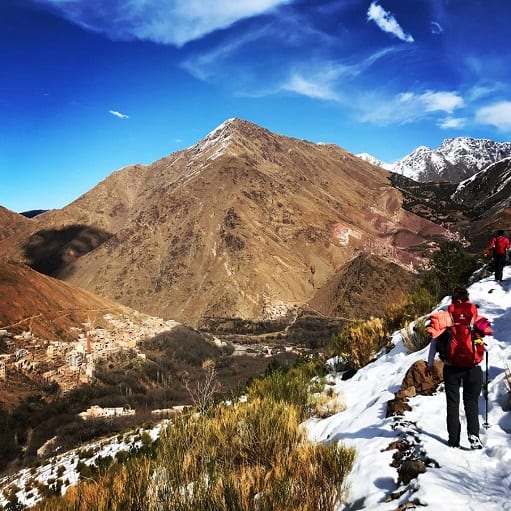
Just look at this wonderful display of tajine, rice with olives, fresh fruit and veggies, and flatbread!! Photo by Sara Rose
Currency
The currency of Morocco is the Moroccan Dirham.
Many places in the more rural villages will not accept credit cards, so get money out ahead of time.
We paid for as many things as we could before our trip. From the airport, we took out cash before leaving security and hopping into our pre-arranged taxi. There is also an ATM at the Medina in Marrakech and in Imlil.
Language
The primary language throughout Morocco is Arabic, however, many Moroccans also speak French.
While those we met in Marrakech and during our guided trek spoke English, this is not the case everywhere throughout the country.
In the Berber villages, people also speak Berber, or Amazigh, a language that is similar to Arabic in origin but technically different.
Information
For information related to Marrakech and Morocco in general, I highly recommend checking out MarocMama. She is an American expat who lives in Marrakech with her family and offers food tours of the Medina and other recommendations essential for travel around the country. Check out her blog post on The Ultimate First-Timers Guide to Morocco.
Of course, you can consult with your chosen guide to ask questions about Morocco travel and logistics.
There is a tourism office located in Marrakech as well:
Visit Marrakech Morocco (Conseil Régional du Tourisme de Marrakech)
Address: Rue Cadi Ayad, N°42, appt 4 Imm Jnane Atlas Guéliz (across from Jardin Harti), Marrakech 40000, Morocco
Phone: +212 5244-33407
Gear
Despite us visiting Morocco in winter, we were well-prepared for the variation in weather we experienced between Marrakech and the Atlas Mountains. Definitely check the forecast before your leave on your trip!
Layers can be incredibly important when hiking in the mountains, especially a waterproof and windproof jacket and pair of pants. Good shoes are essential for a summit trek, as the elevation gain and loss can do a number on your feet.
Certain pieces of hiking equipment may be necessary to aid in your hiking comfort, such as trekking poles. ONLY pack trekking poles if you intend to check your bag at the airport. Marrakech security is very strict and your poles will be taken away from you if they are carried onto the plane on your carry-on (I have personal experience with this). These poles are my favorite:
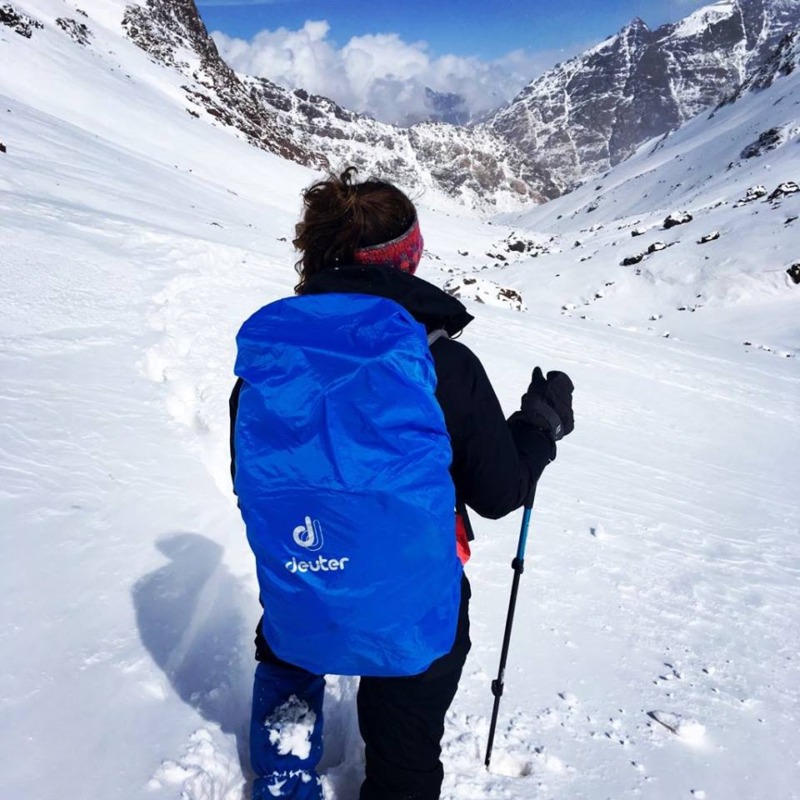
Plenty of layers and planning ahead for gear made us more comfortable and prepared when the weather turned. On our last day, the sun was shining.
Have you trekked the Atlas Mountains? Are you planning to go? I would love to hear about your experiences!
Happy Trekking,
Christa
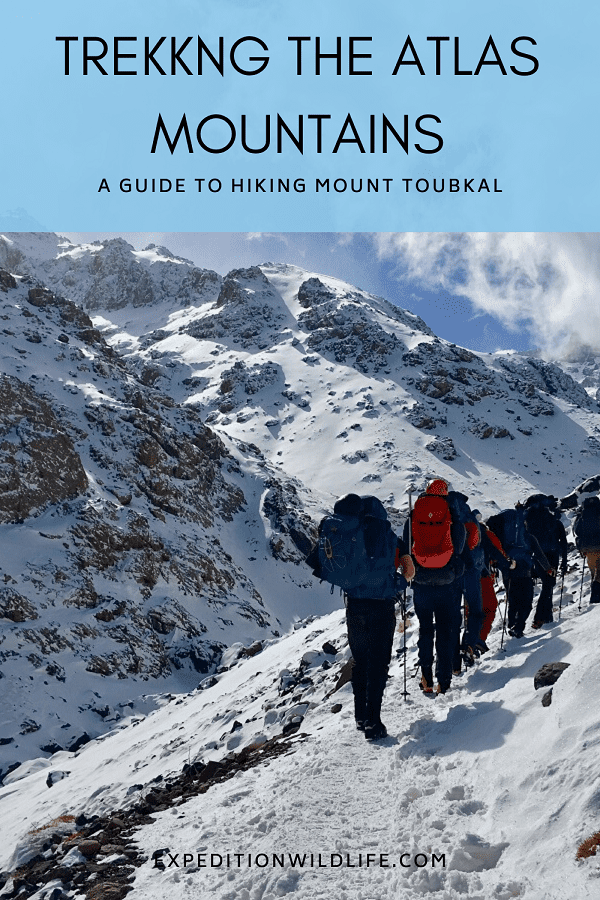

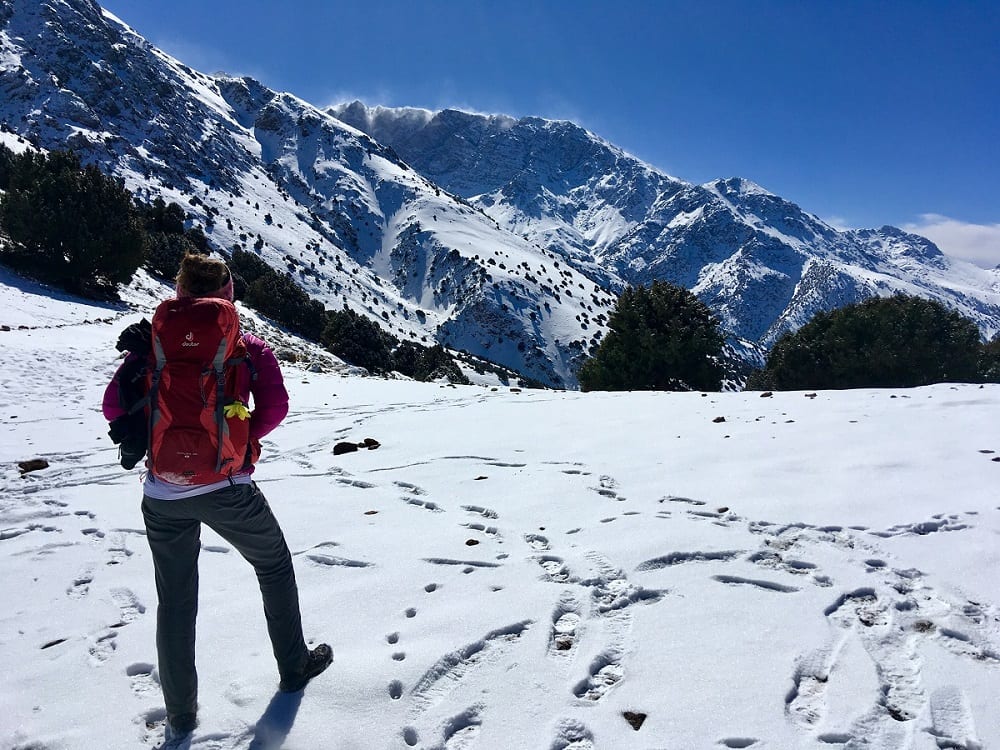
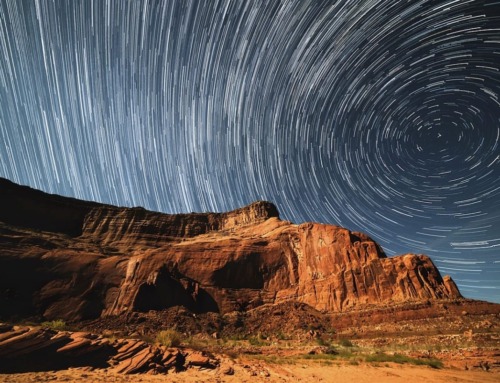
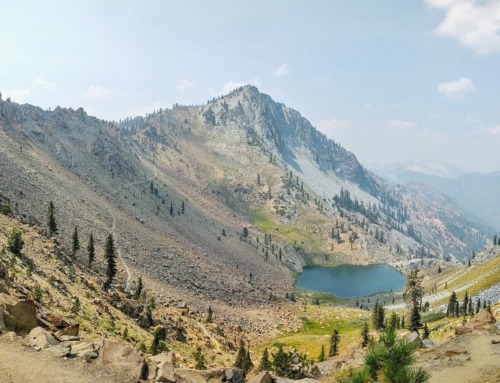
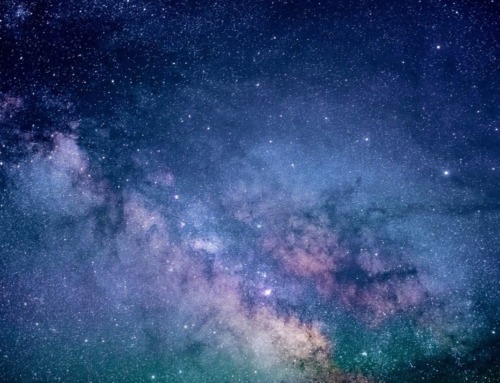
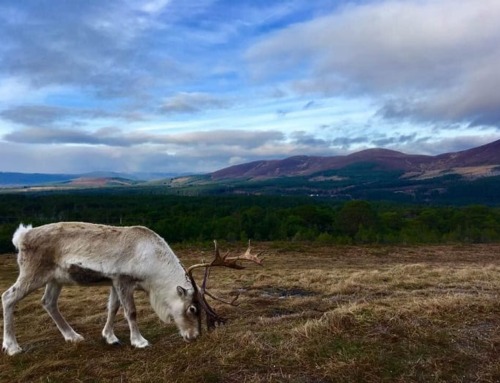
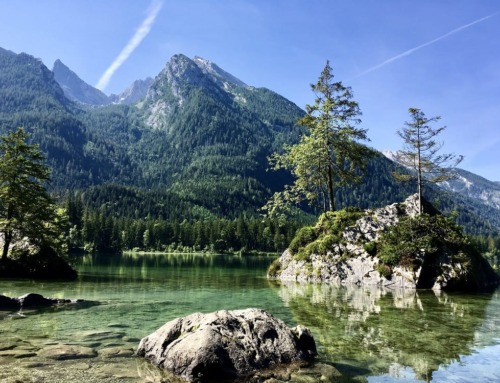
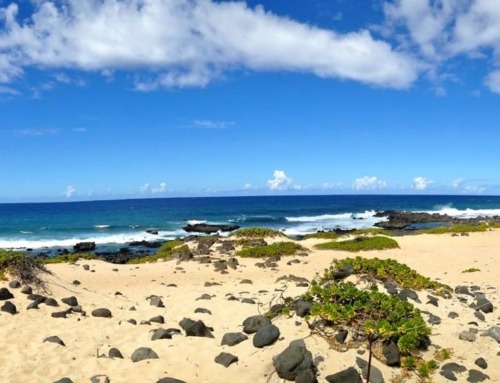
The surroundings are simply beautiful and we had an amazing time! Since we are relatively inexperienced, our guide Hamid was very helpful and patient. Hamid and his team prepared wonderful meals and provided us with a good tent to spend the night. For people who are inexperienced in multi-day hiking (just like us), we would recommend the Toubkal ascent in 3 days. We think this will make the hike more pleasant and balanced. Overall, we would highly recommend Hamid from imlil-trekking.com and his team as your guide in the Atlas mountains. Visited in September 2019 more information visit: http://imlil-trekking.com
Awesome that you had a good trip, Martin, and thank you for the note about ascending in 3 days for beginner hikers.